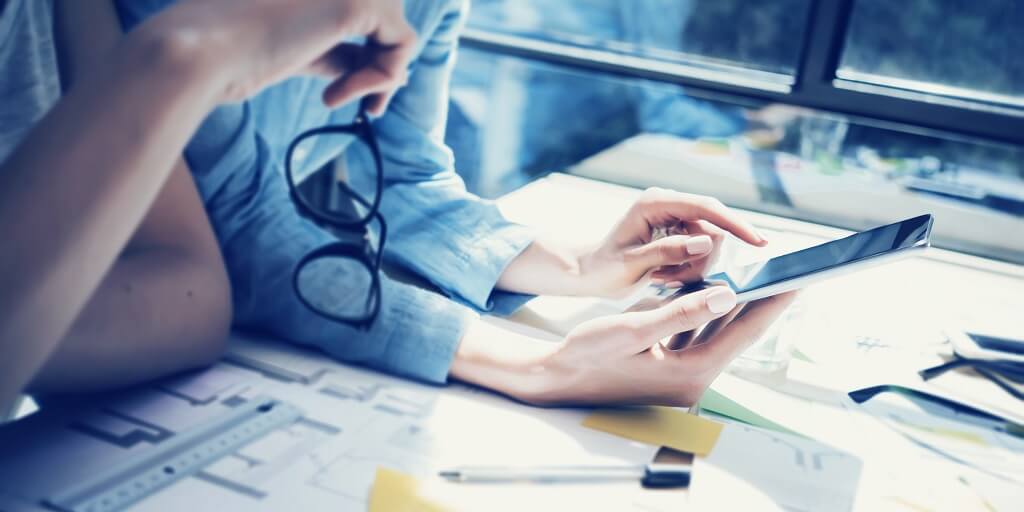Technology may be about to revolutionise the face of the modern office, affecting everything from how we work to what we work on.
In offices today, we’re surrounded by technology – but in many ways little has changed since the mid-20th century, when each desk would have a typewriter and a phone anchored to it, and an employee stuck in front of them for eight hours a day.
But new technology may be about to radically alter the spaces we work in – from Amazon Echo-style “smart speakers”, to workplace apps and virtual reality systems.
Today, companies such as Vuzix are already designing “smart glasses” for employees, which “overlay” information on the real world. Others are even testing “video walls” – but Facebook has said that in the near future it hopes to offer VR experiences as intense as teleporting to another place, to allow people to meet online in 3D, perhaps even in a simulated version of the office.
We find that in modern offices, 53pc of desks are unused at any time
Philip Ross, founder and CEO of Unwork.com, says: “Our parents and grandparents grew up with the sedentary office, where if you wanted to contact someone, you’d call their desk phone. But that’s all dead. Almost all of that is up for grabs.
“Now you can carry the computer you need, and connect wirelessly. By untethering people from a desk, you then ask the question: ‘Why do we give anyone a desk?’ We find that in modern offices, 53pc of desks are unused at any time.
“One big change that’s coming is the app-centric workplace – just like we use Uber or Deliveroo. A workplace app might book you a desk, check the food, and handle your messages. Within the building, AI might work out which people are working closely and book seats for them to sit together, so that they can work more easily.”
Smarter environments
Offices could also become intelligent, with voice command systems allowing people to “talk” to the walls, and sensors tracking everything from energy use to when computers are used – using the so-called internet of things (IoT).
Chris Russell, managing director of “smart” energy company Tonik, says: “The IoT presents an opportunity to integrate a lot of different devices and information sources – automating heating and lighting to save money, and providing security by keeping an eye out when no one’s there.”
There are still many occasions when being in the same room just can’t be beaten; VR will help bridge that gap
But location-aware services within offices could go much further. Google is already testing an indoor GPS-like system called the Visual Positioning System, which would mean “augmented reality” apps for offices – similar to Pokémon Go, but for work.
Faizaan Ghauri, CEO of 3D mapping company WRLD, is already producing highly detailed maps of premises for Cisco. He says: “3D mapping is set to become the bridge between the physical and digital working environment. The most obvious benefit of interior 3D maps is as an orientation tool for employees and visitors.
“With geospatial accuracy – right down to mapping the plug sockets – the time spent locating vacant desks, available meeting rooms, colleagues and even office facilities could be dramatically reduced.”
Mr Ghauri also says that companies may use such maps so that employees can put on a VR headset to “come to work” – appearing as a virtual “ghost” in a 3D version of their real office.
He continues: “While communications technology has improved over the years, there are still many occasions when being in the same room just can’t be beaten; VR will help bridge that gap.
“Having a 3D digital twin of an office will yield long-term advantages so that when the technology is ready and employee adoption increases, the office can be experienced in the VR and AR.”
Changing priorities
Trevor Hardy, CEO of consultancy The Future Laboratory, says that the biggest change may not be in the physical office itself – but in how we work.
Mr Hardy says that “personal assistants”, like the AI that answers questions in Google Home, will allow us to do less by automating more and more of the work we do.
He continues: “AI is going to allow each of us to have personal assistants. In effect, it will allow us to do less – and free up more time and more mental capacity. Ever since technology began, we have become more productive – but we’ve just been doing more ourselves.
“AI might free up enough time so that we stop thinking: ‘I have never worked more and have never worked harder.’ It might free us up enough so that we have time to be better people.”
As Europe’s leading specialist electronics provider, Currys PC World Business is on hand to help you find the right technology for your business. Visit curryspcworldbusiness.co.uk for expert tips on how to transform your business today.


